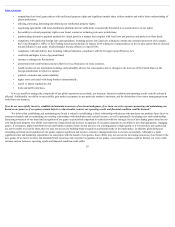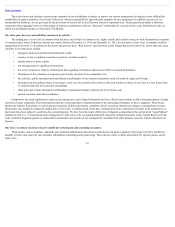Zynga 2015 Annual Report Download - page 33
Download and view the complete annual report
Please find page 33 of the 2015 Zynga annual report below. You can navigate through the pages in the report by either clicking on the pages listed below, or by using the keyword search tool below to find specific information within the annual report.
Table of Contents
In addition, if a game contains objectionable content, we could experience damage to our reputation and brand. Despite reasonable precautions, some
consumers may be offended by certain of our game content. If consumers believe that a game we published contains objectionable content, it could harm our brand
and consumers could refuse to play it and could pressure the digital storefront operators to no longer allow us to publish the game on their platforms. Similarly, if
any of our games are introduced with defects or have playability issues, we may receive negative user reviews and our brand may be damaged. These issues could
be exacerbated if our customer service department does not timely and adequately address issues that our players have encountered with our games.
Ourexistingandpotentialplayersmaybeattractedtocompetingformsofentertainmentsuchasofflineandtraditionalonlinegames,television,moviesand
sports,aswellasotherentertainmentoptionsontheInternet.
Our players face a vast array of entertainment choices. Other forms of entertainment, such as offline, traditional online, personal computer and console
games, television, movies, sports, RMG and the Internet, are much larger and more well-established markets and may be perceived by our players to offer greater
variety, affordability, interactivity and enjoyment. These other forms of entertainment compete for the discretionary time and income of our players. If we are
unable to sustain sufficient interest in our games in comparison to other forms of entertainment, including new forms of entertainment, our business model may no
longer be viable.
Competitioninourindustryisintenseandtherearelowbarrierstoentry.
Our industry is highly competitive and we expect more companies to enter the sector and a wider range of social games to be introduced. Our competitors
that develop games for networks, on both web and mobile, vary in size and include companies such as DeNA Co. Ltd. (Japan), Electronic Arts Inc., Gameloft SA,
GREE International, Inc., Glu Mobile Inc., King.com Inc., Rovio Mobile Ltd., Supercell Inc., GungHo Online Entertainment, Inc., Kabam and The Walt Disney
Company. In addition, online game developers and distributors who are primarily focused on specific international markets, such as Tencent Holdings Limited in
Asia, and high-profile companies with significant online presences that to date have not developed social games, such as Facebook, Apple Inc., Google Inc. and
Microsoft Corporation, may decide to develop social games. Some of these current and potential competitors have significant resources for developing or acquiring
additional games, may be able to incorporate their own strong brands and assets into their games, have a more diversified set of revenue sources than we do and
may be less severely affected by changes in consumer preferences, regulations or other developments that may impact our industry. In addition, we have limited
experience in developing games for mobile and other platforms and our ability to succeed on those platforms is uncertain. We expect new game competitors to
enter the market and existing competitors to allocate more resources to develop and market competing games and applications.
As there are relatively low barriers to entry to develop a mobile or online casual game, we expect new game competitors to enter the market and existing
competitors to allocate more resources to develop and market competing games and applications. We also compete or will compete with a vast number of small
companies and individuals who are able to create and launch games and other content for devices and platforms using relatively limited resources and with
relatively limited start-up time or expertise. The proliferation of titles in these open developer channels makes it difficult for us to differentiate ourselves from other
developers and to compete for players without substantially increasing our marketing expenses and development costs. Increasing competition could result in loss
of players, loss of talent or loss of our ability to acquire new players in a cost-effective manner, all of which could harm our business.
Ourrevenuemaybeharmedbytheproliferationof“cheating”programsandscamoffersthatseektoexploitourgamesandplayers,whichmayaffectthe
game-playingexperienceandmayleadplayerstostopplayingourgames.
Unrelated third parties have developed, and may continue to develop, “cheating” programs that enable players to exploit vulnerabilities in our games, play
them in an automated way or obtain unfair advantages over
30
























